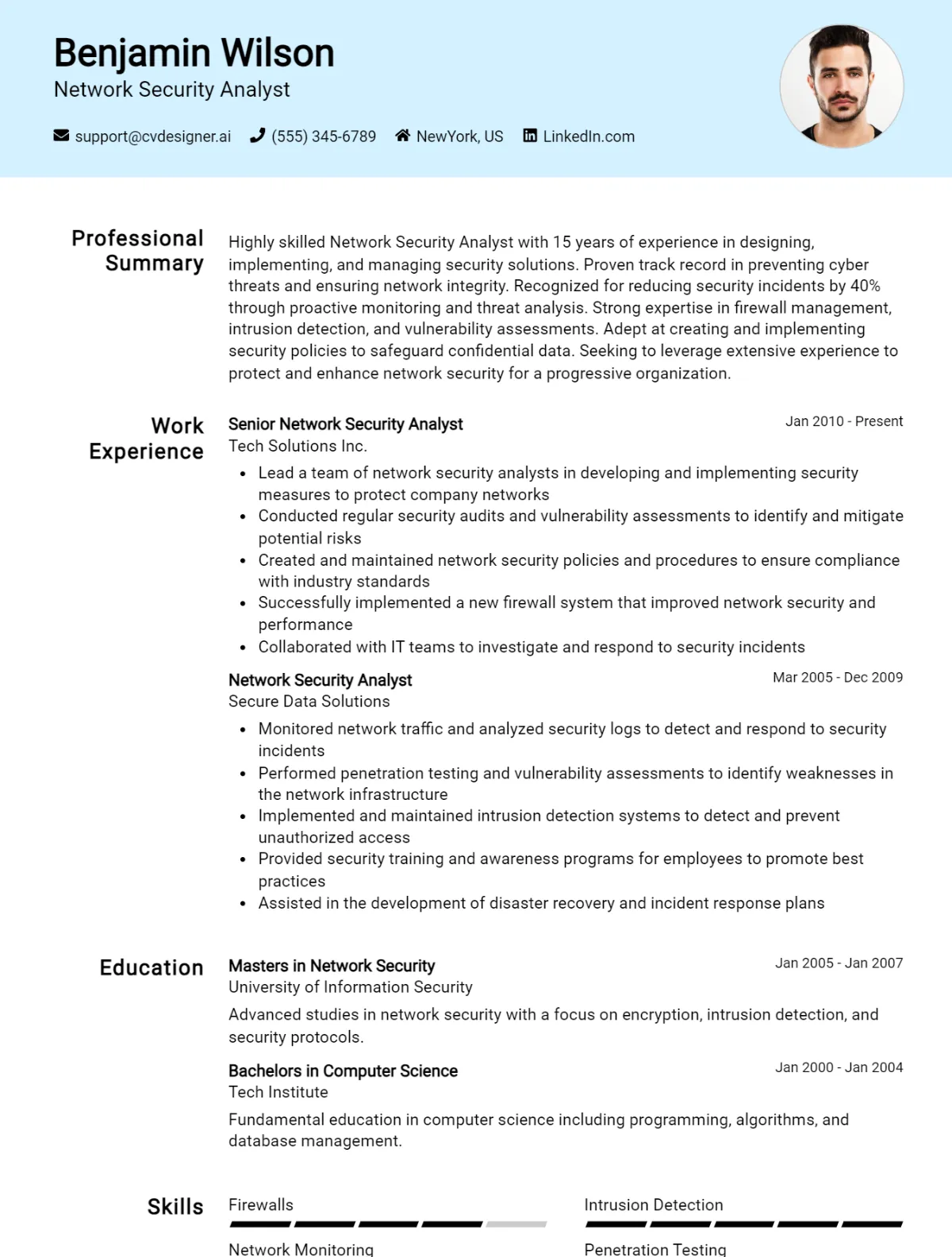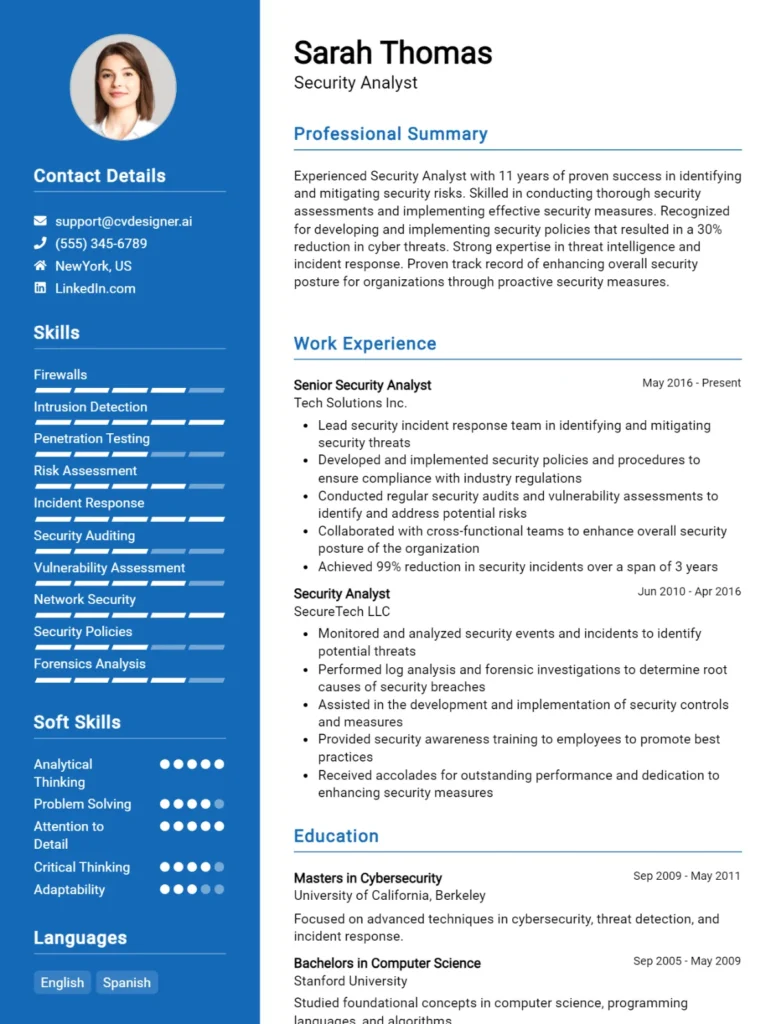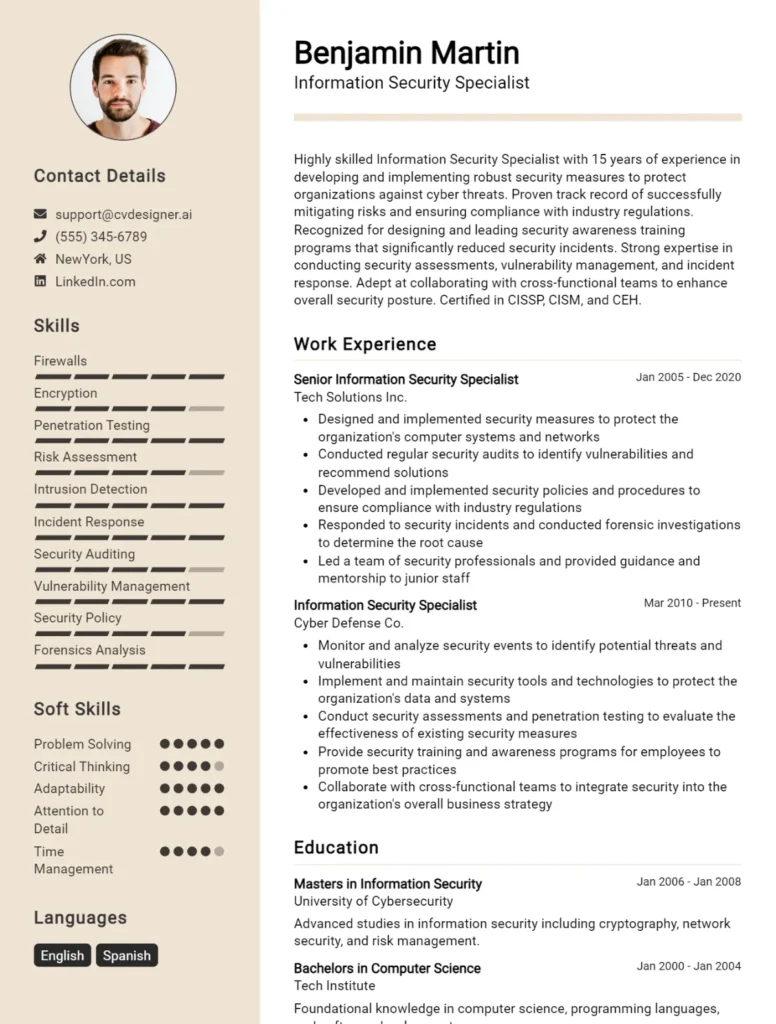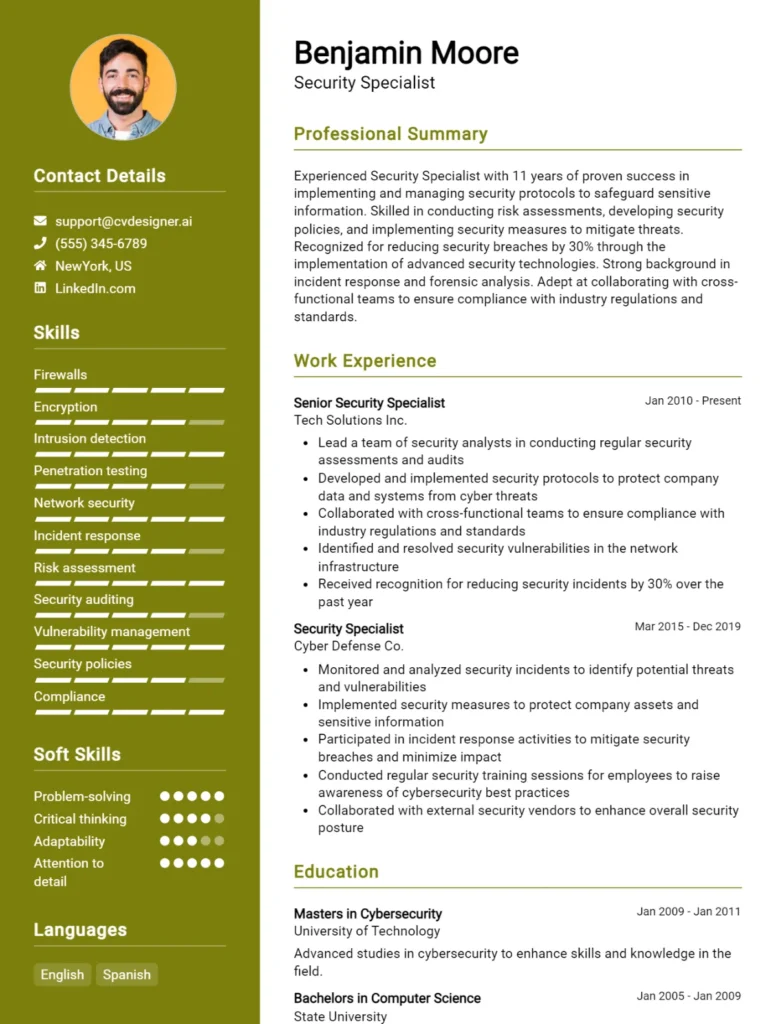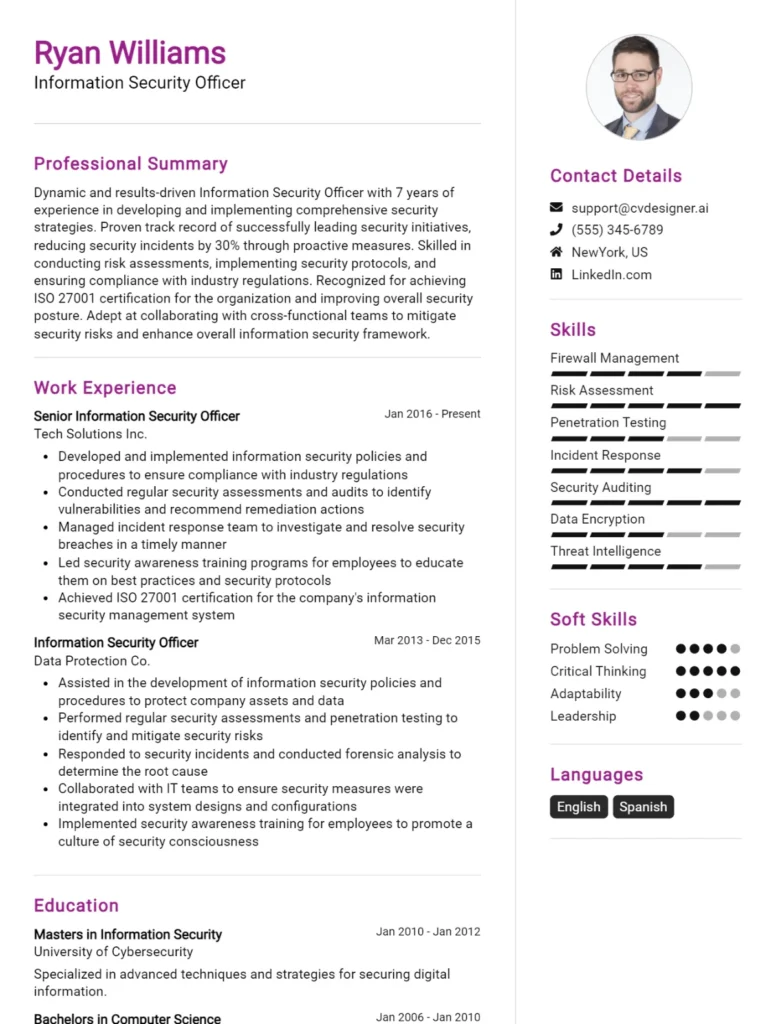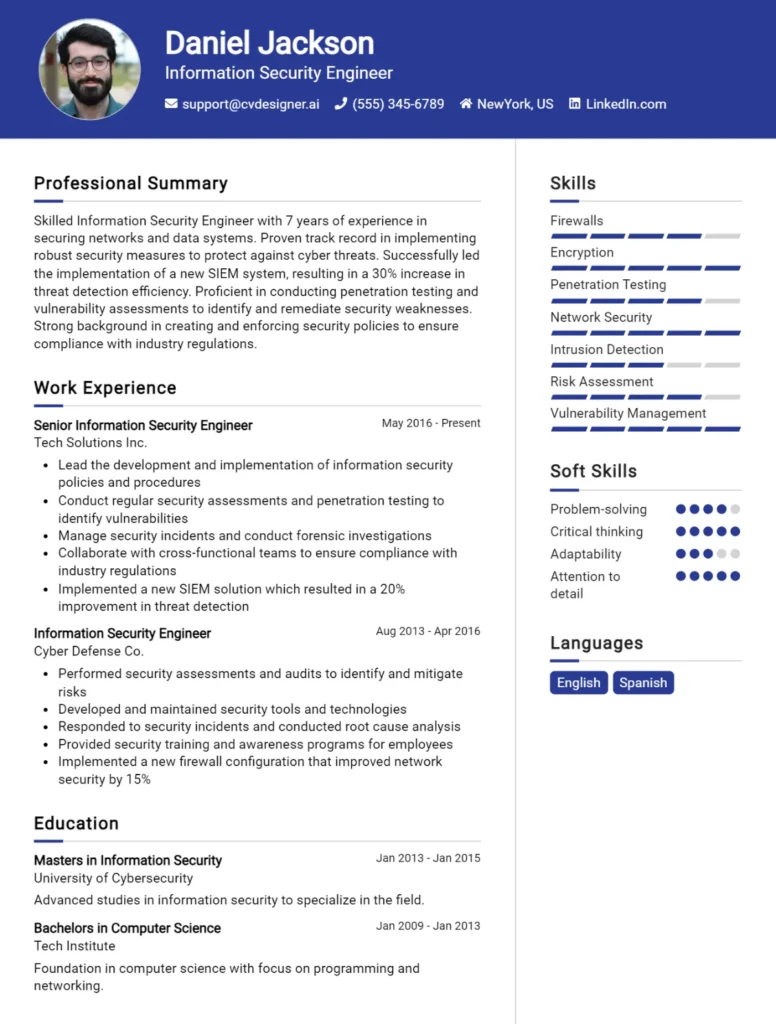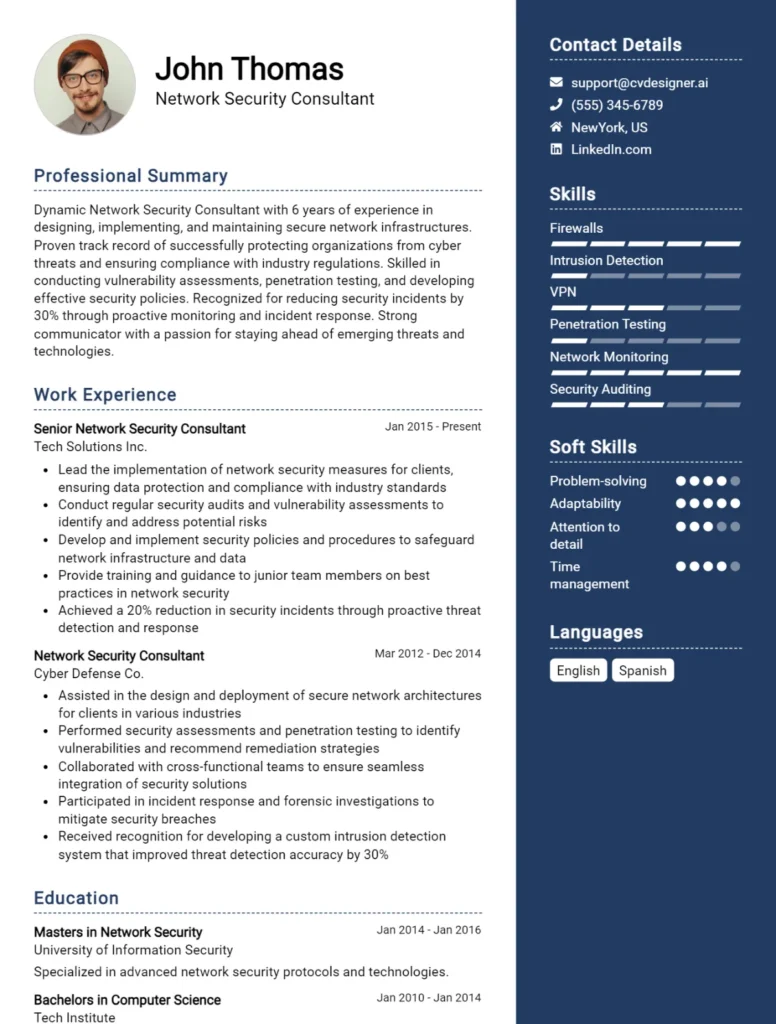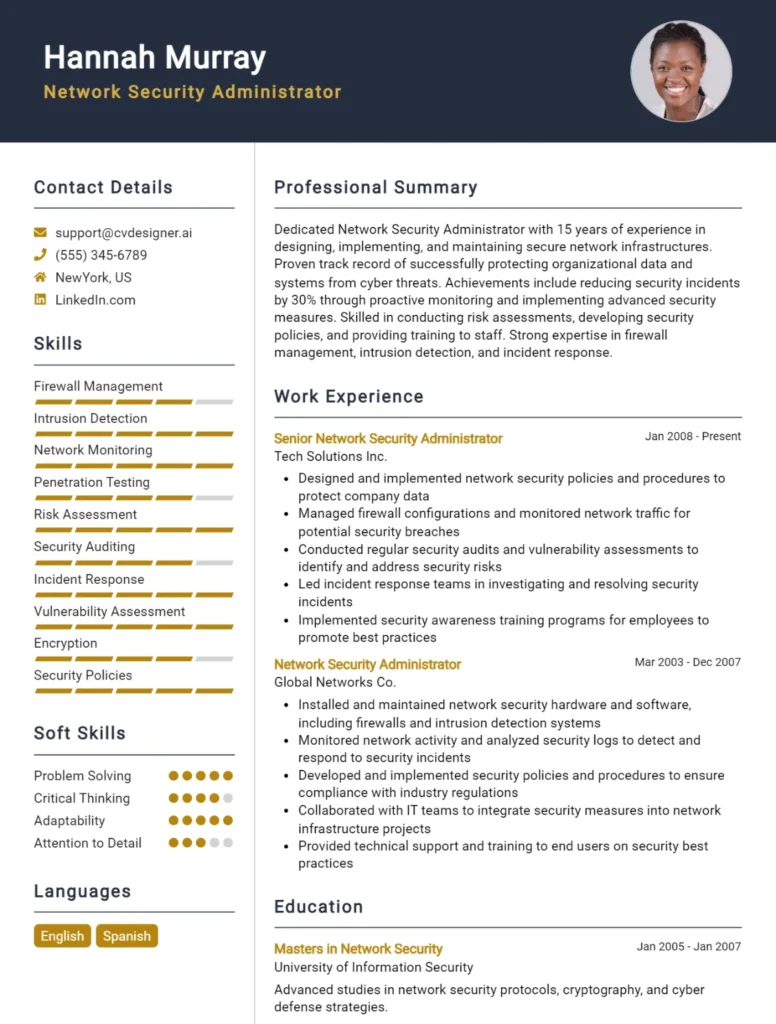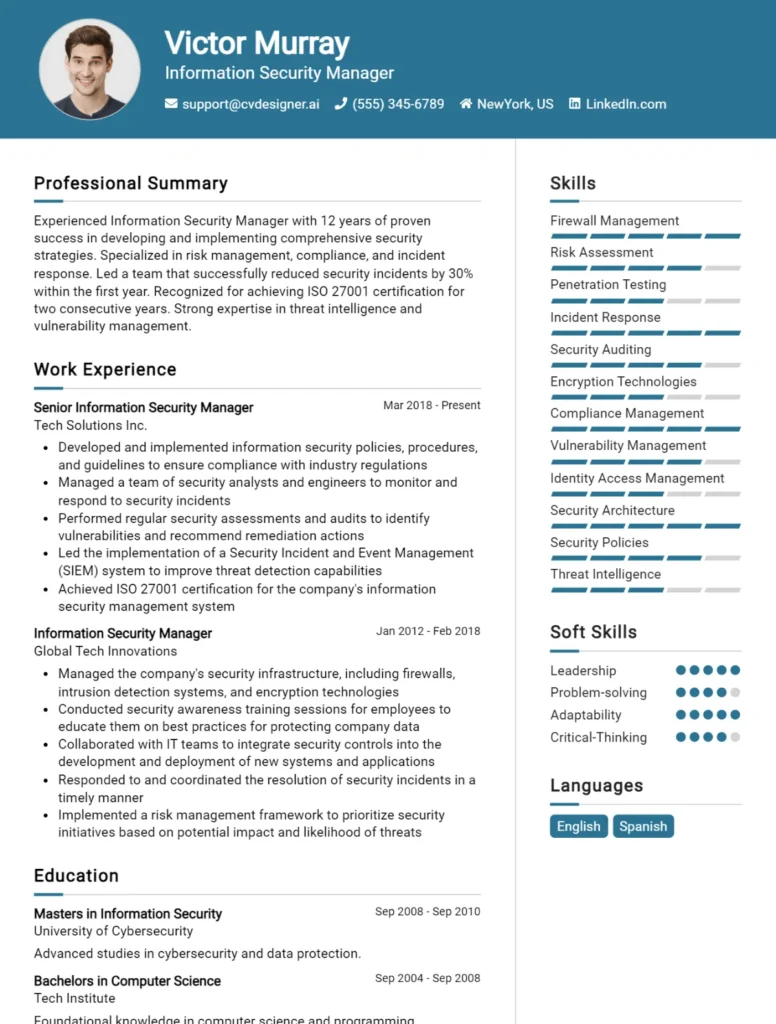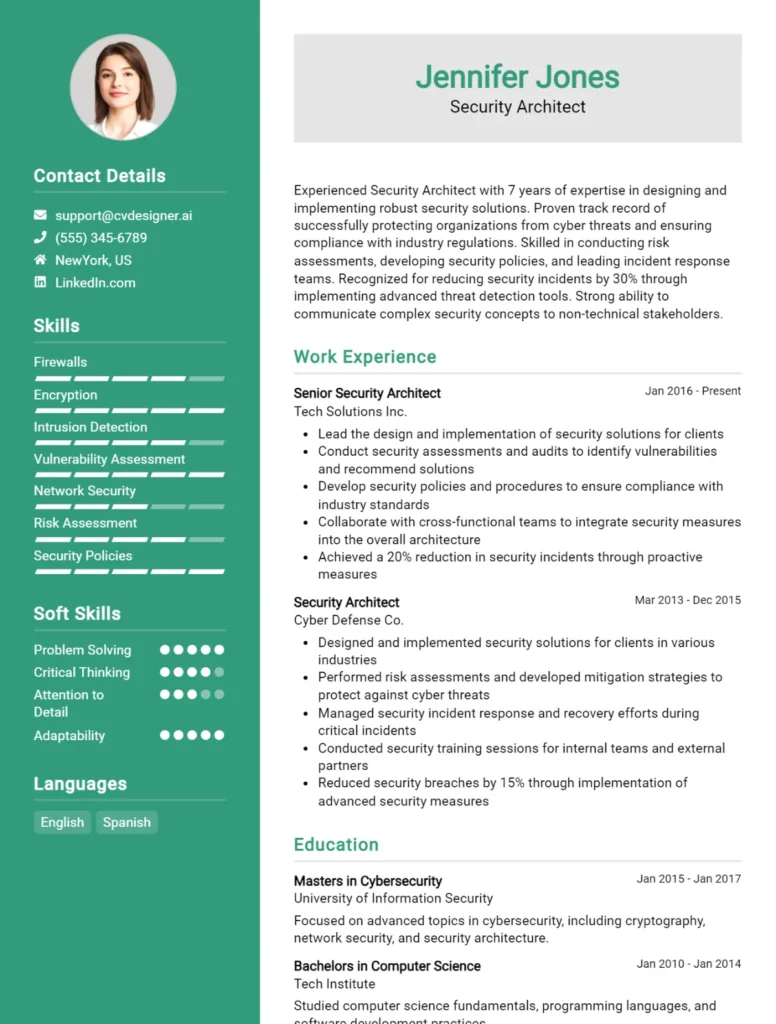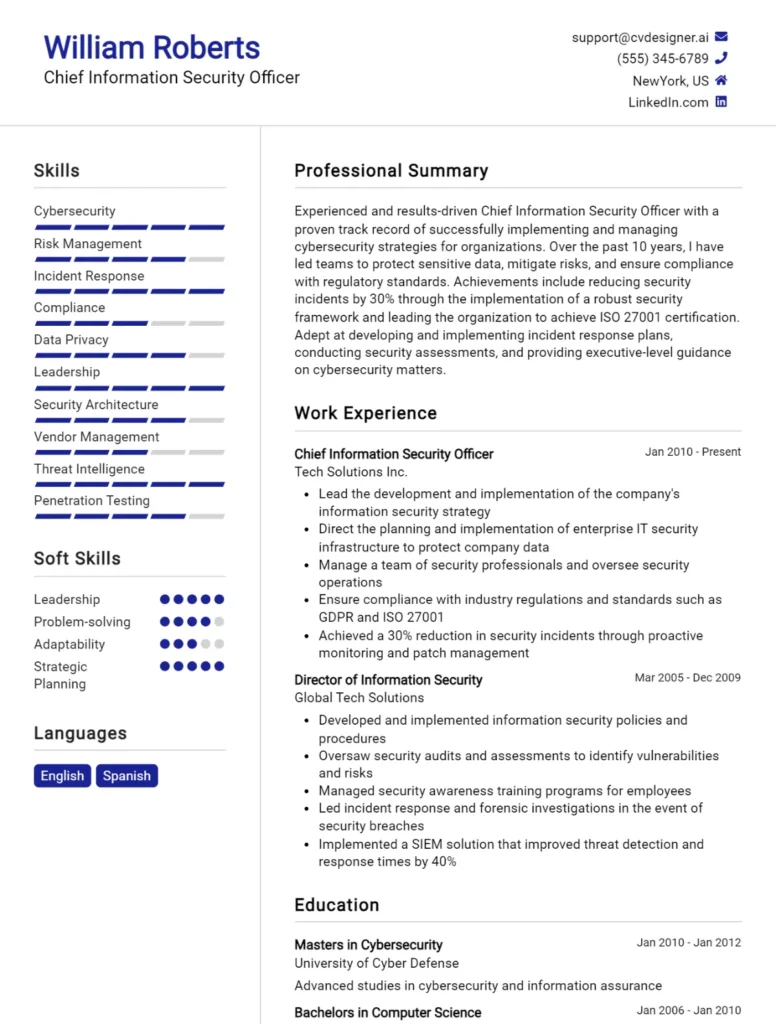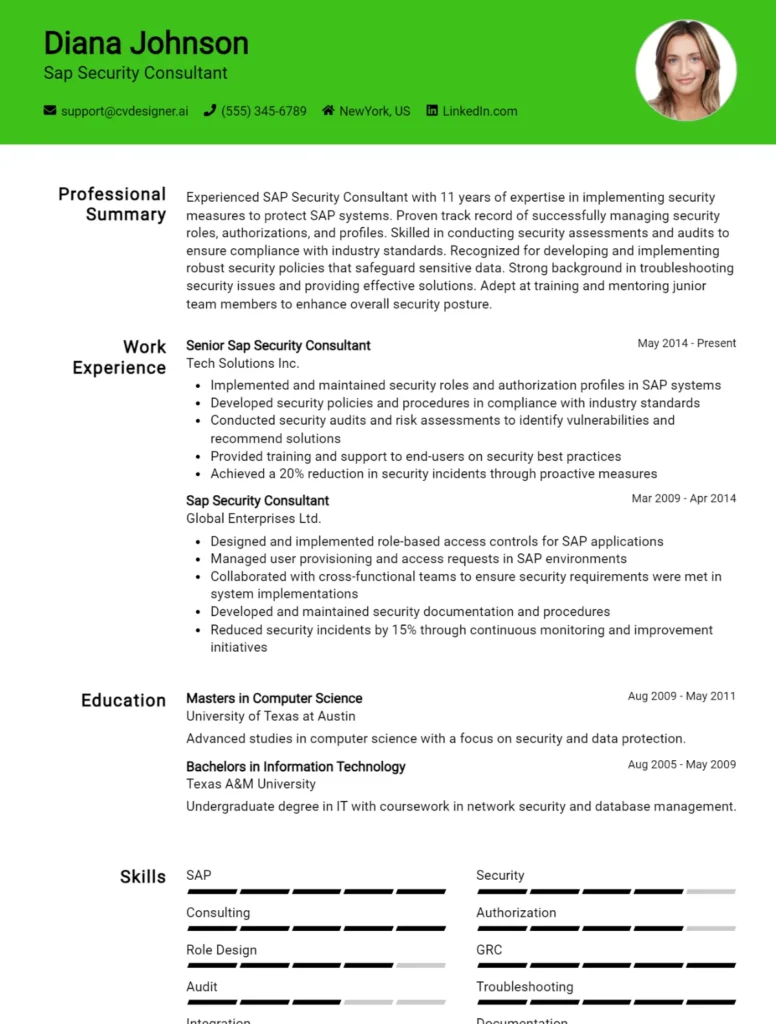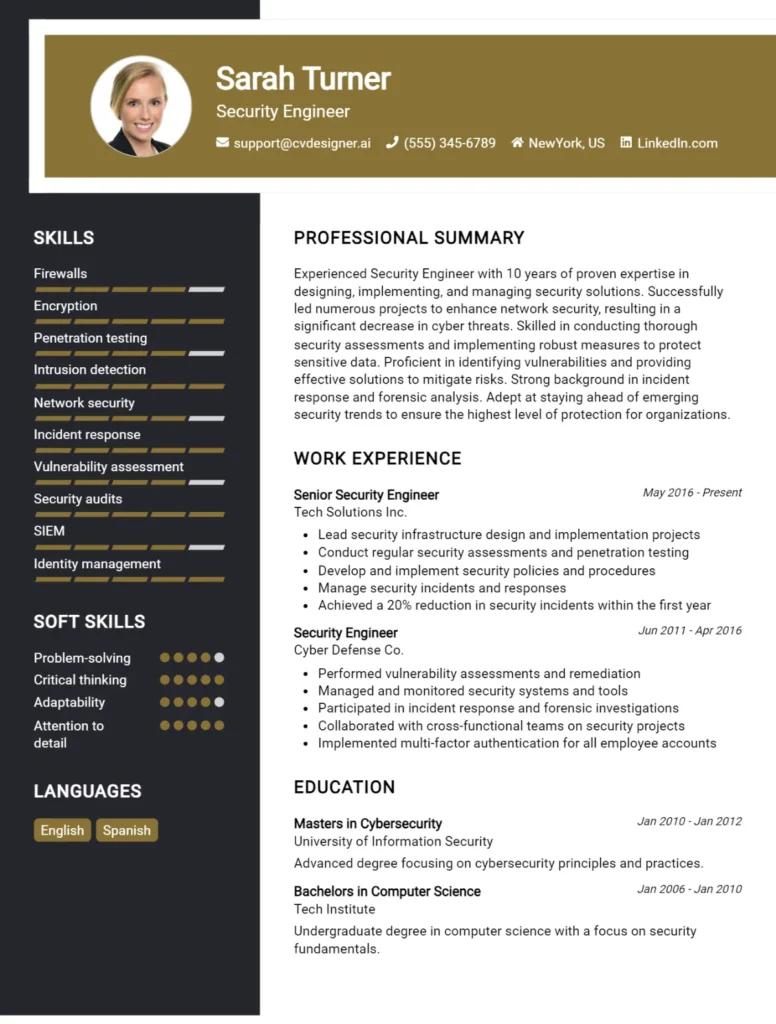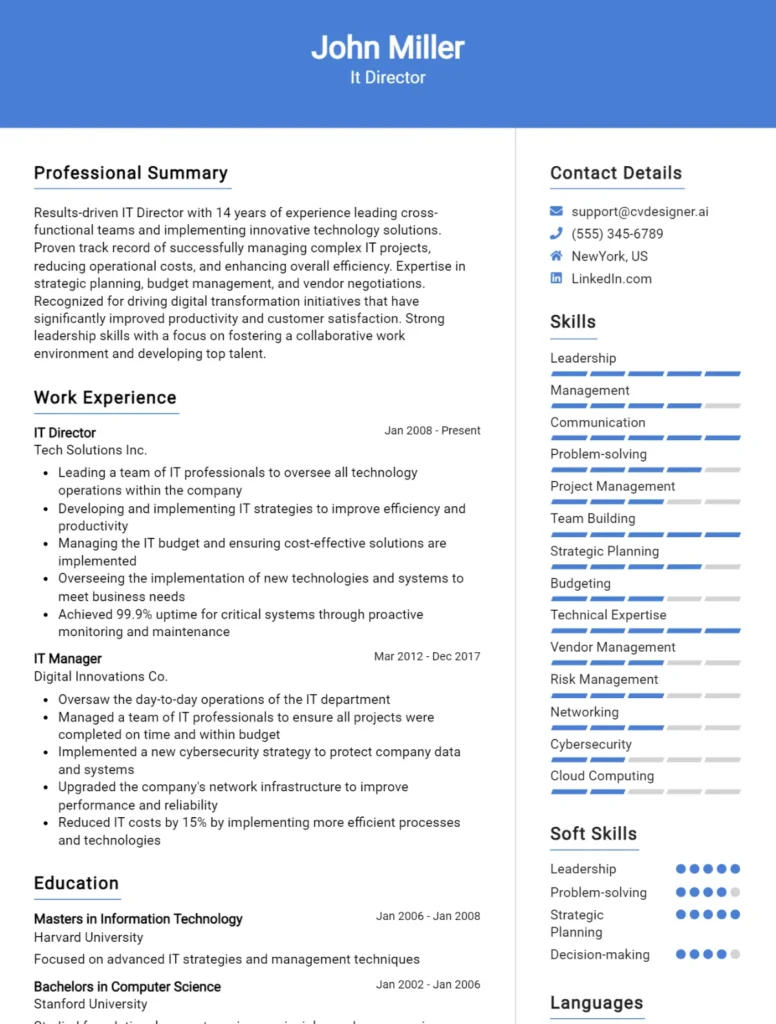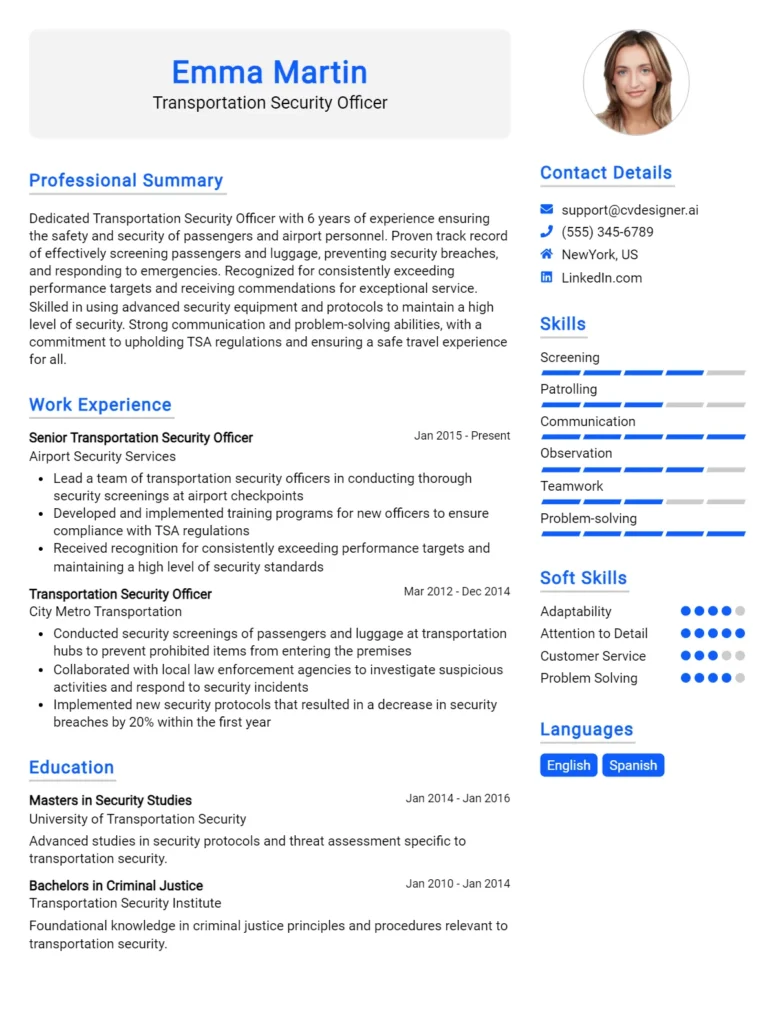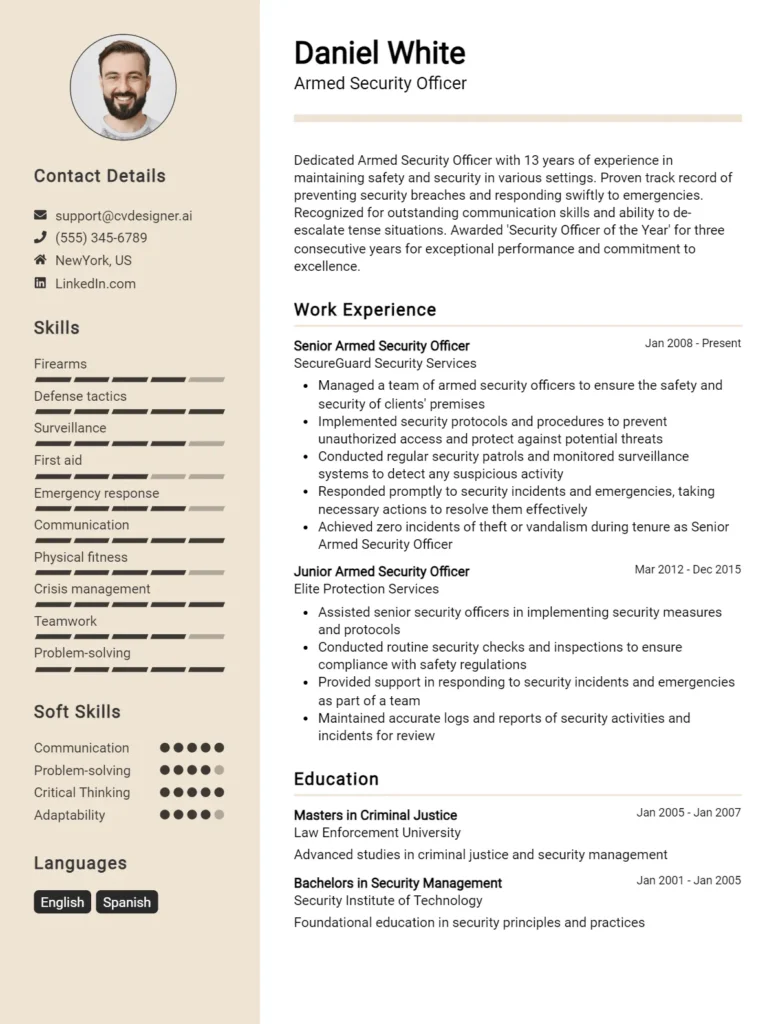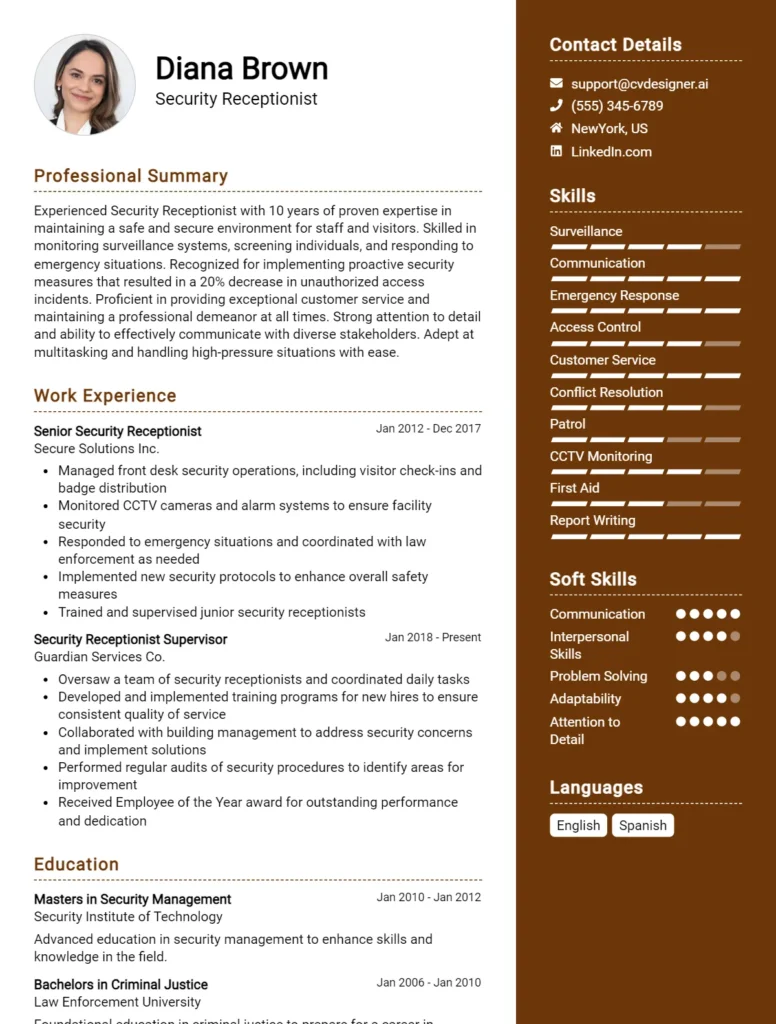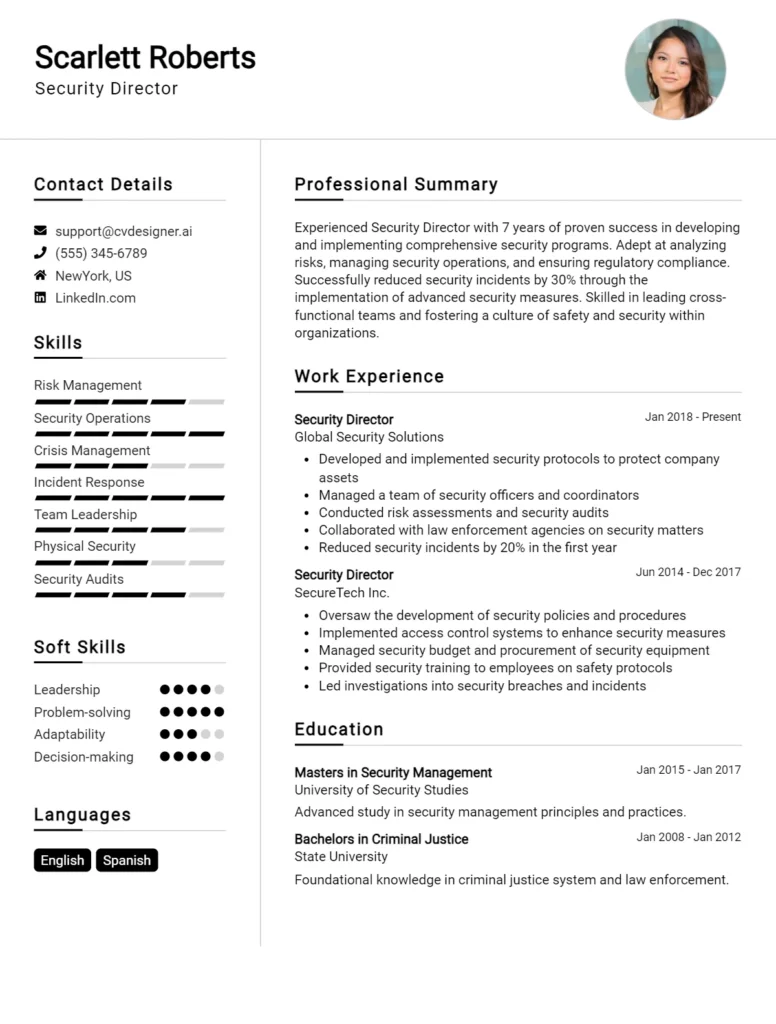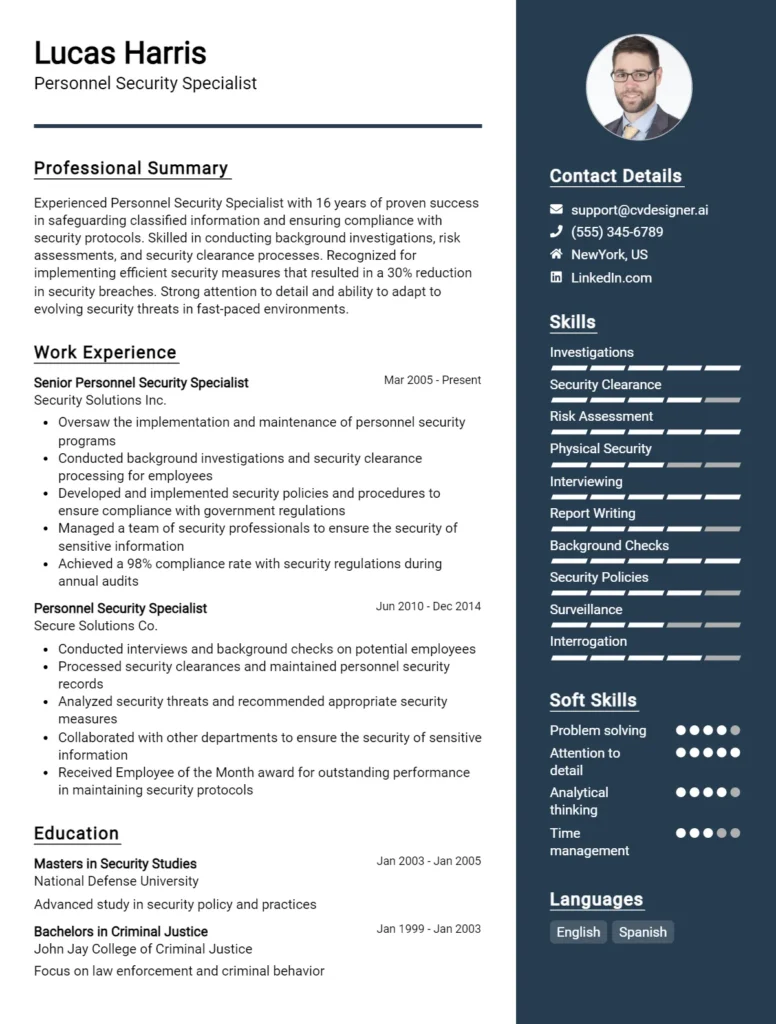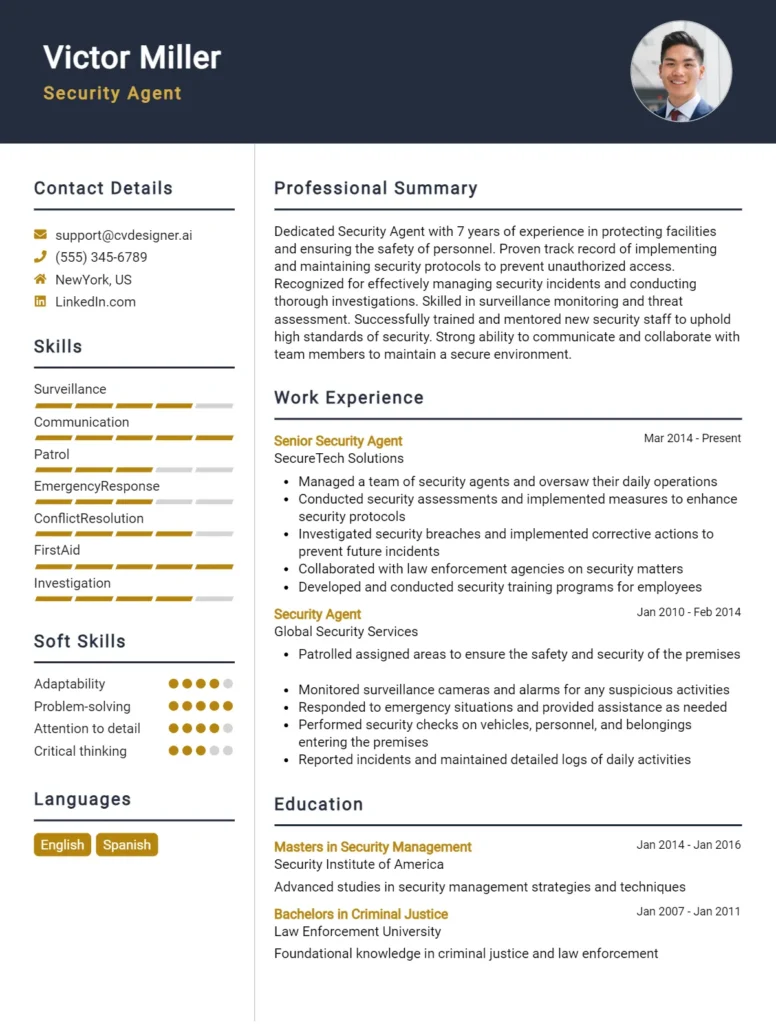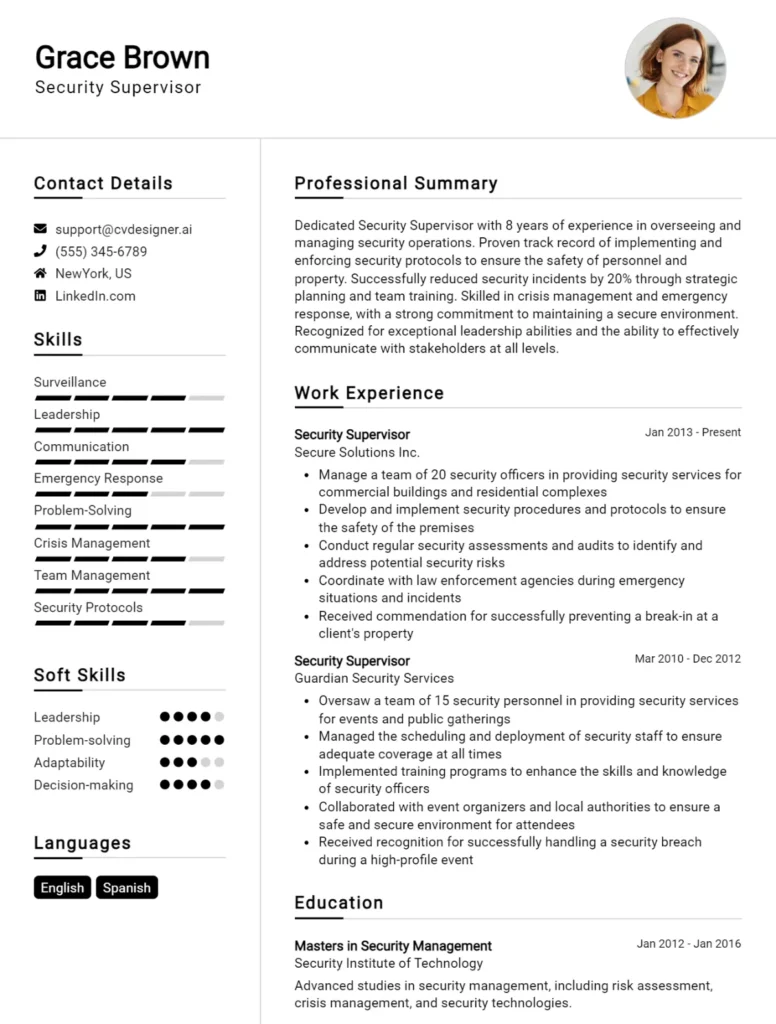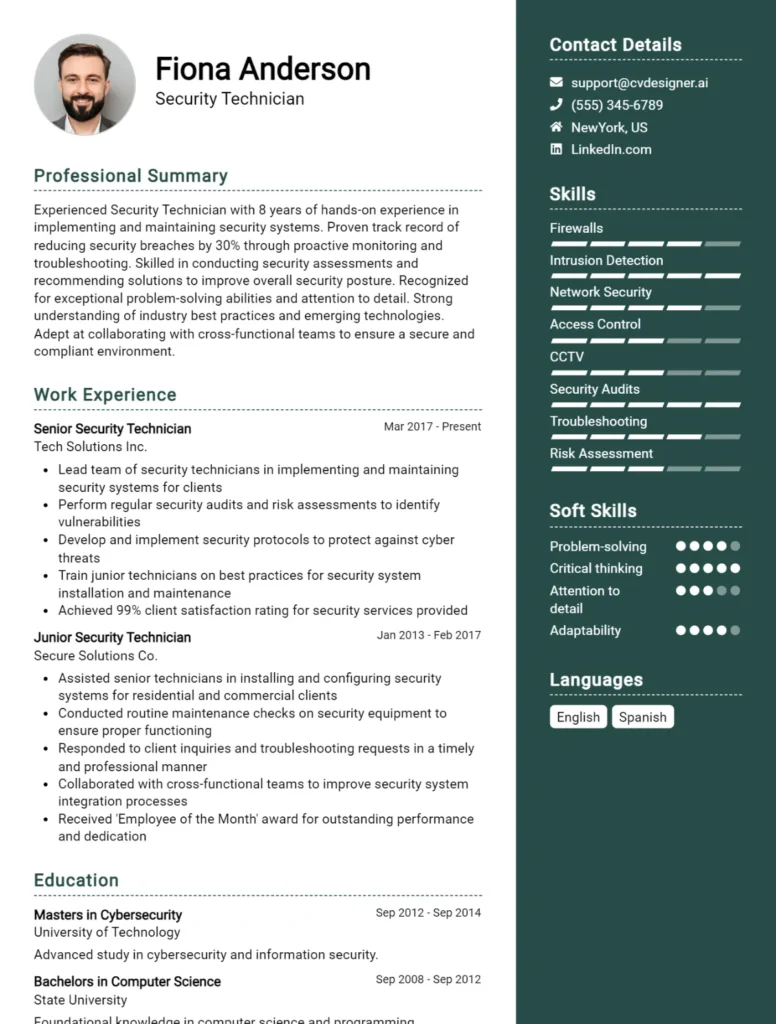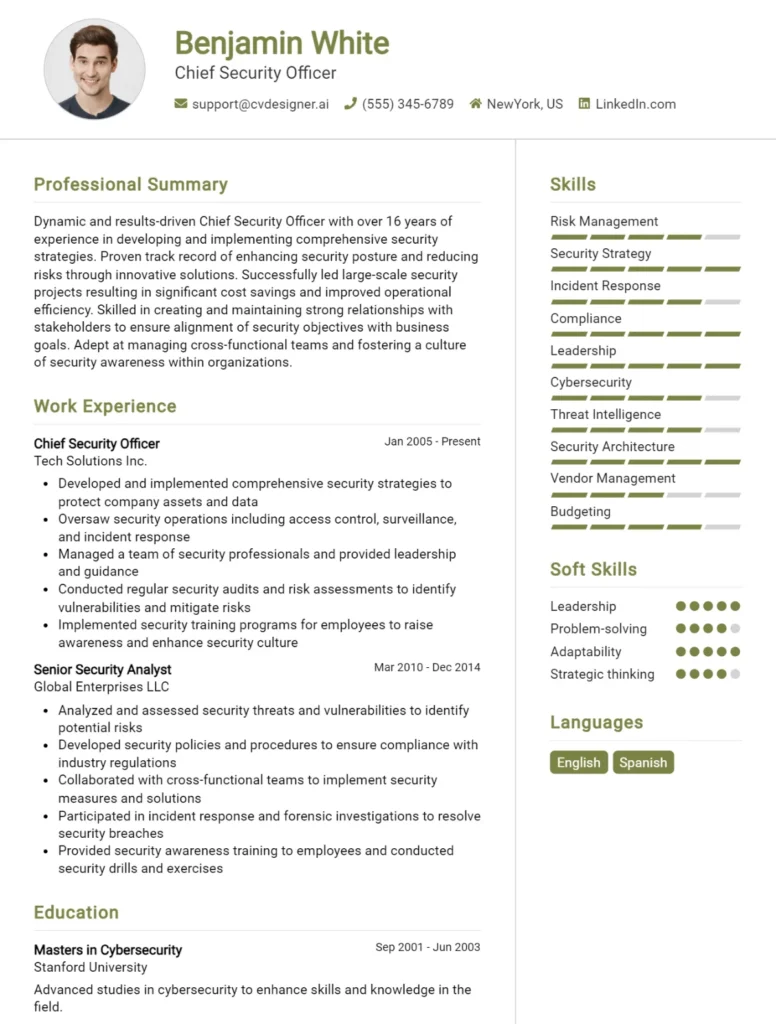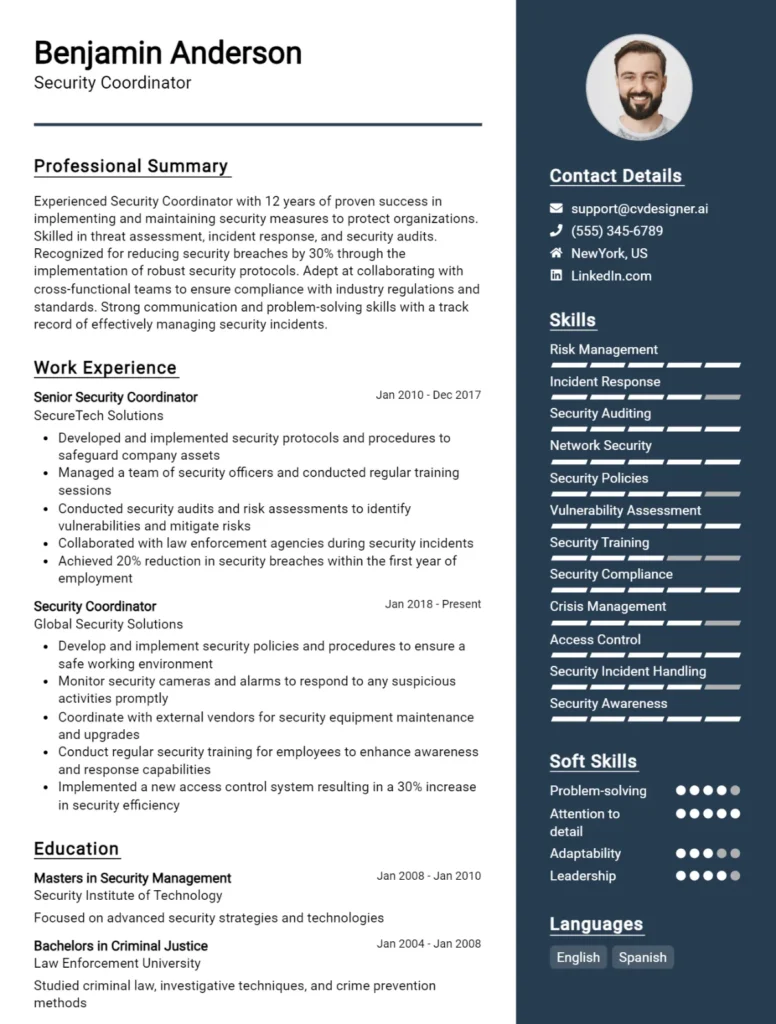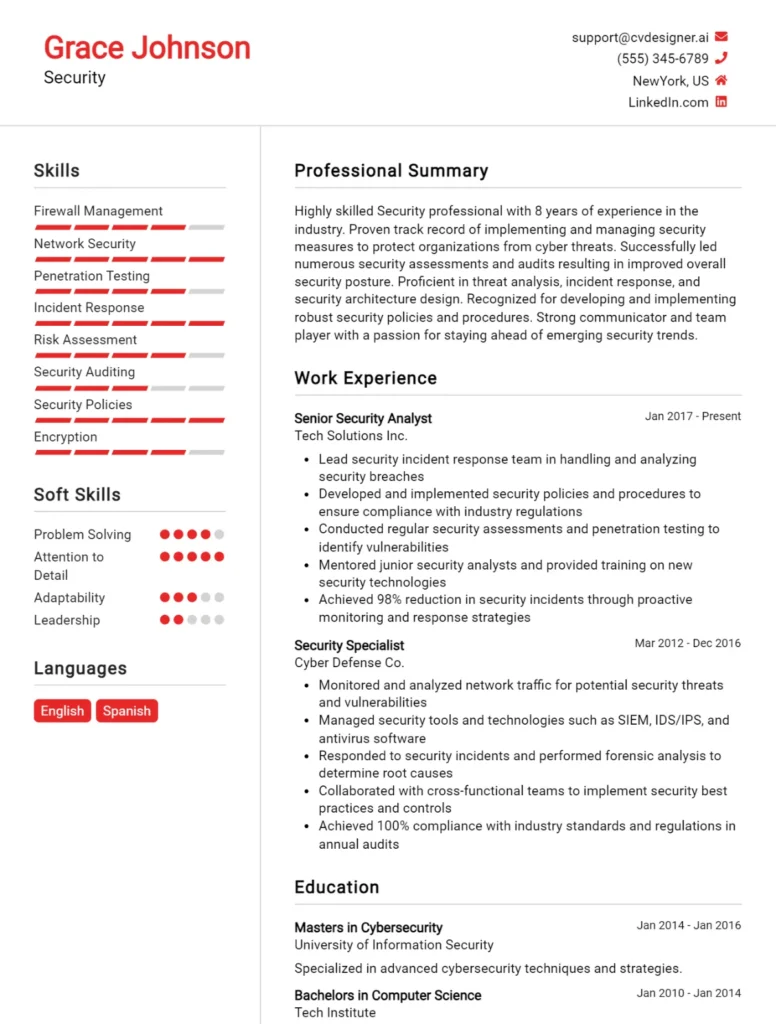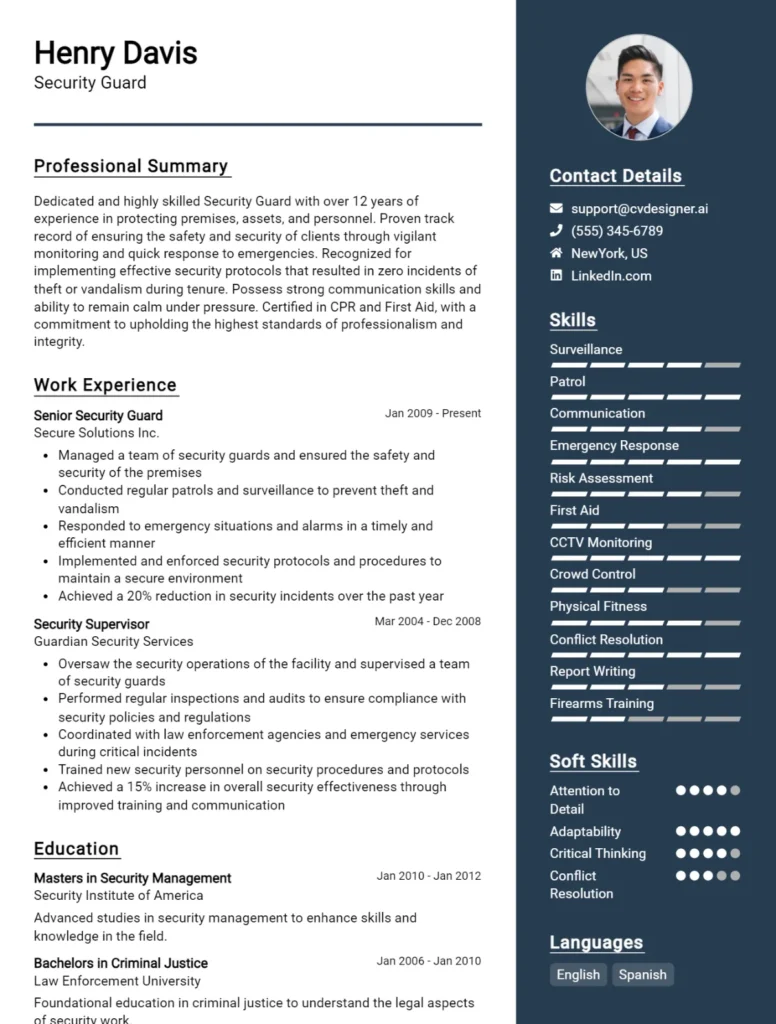Most Popular Network Security Analyst CV Examples
Explore additional Network Security Analyst CV samples and guides and see what works for your level of experience or role.
As the digital landscape expands, the demand for skilled Network Security Analysts continues to rise, making it essential for aspiring professionals to craft a standout CV that showcases their expertise. In this comprehensive guide, we will explore the critical elements of a winning CV tailored specifically for Network Security Analysts. Whether you're a seasoned expert or just starting your career in cybersecurity, understanding how to effectively communicate your skills and experiences can set you apart in a competitive job market. Throughout this article, you will discover:
- Key skills and qualifications to highlight for Network Security Analyst roles.
- Effective ways to format your CV for maximum impact.
- Tips on how to tailor your CV for specific job applications.
- Examples of strong professional summaries and descriptions of relevant experience.
- Common pitfalls to avoid when writing your CV.
Dive in to learn how to elevate your CV and increase your chances of landing your dream job in network security!
What is a Network Security Analyst CV?
A Network Security Analyst CV is a crucial document that outlines an individual's skills, experiences, and qualifications specifically related to the field of network security. This CV serves as a first impression for potential employers, highlighting the candidate's proficiency in safeguarding computer networks, identifying vulnerabilities, and implementing security measures. It is essential for conveying one's technical expertise in areas such as firewalls, intrusion detection systems, and cryptography. A well-crafted CV can significantly enhance a job seeker’s chances of landing an interview, as it effectively showcases their ability to protect sensitive information and maintain robust security protocols.
The importance of a CV for a Network Security Analyst extends beyond mere information; it acts as a marketing tool that reflects a candidate’s professionalism and attention to detail. A compelling CV not only outlines relevant experience and certifications but also demonstrates a clear understanding of the evolving landscape of cybersecurity threats. By utilizing resources like a cv writing guide and a cv maker, candidates can create tailored CVs that resonate with hiring managers, ultimately paving the way for career advancement in this critical field.
Key Components of a Network Security Analyst CV
- Contact Information: Include your full name, phone number, email address, and LinkedIn profile to ensure potential employers can easily reach you.
- Professional Summary: A brief summary highlighting your expertise in network security, key achievements, and what you can bring to the role.
- Technical Skills: List relevant skills such as firewall management, intrusion detection systems, and network protocols. For a detailed breakdown of essential skills, refer to skills.
- Certifications: Include any relevant certifications such as Certified Information Systems Security Professional (CISSP), Certified Ethical Hacker (CEH), or CompTIA Security+.
- Education: Detail your academic background, including degrees earned, institutions attended, and graduation dates.
- Work Experience: Provide a comprehensive overview of your previous roles related to network security. Describe your responsibilities and achievements in each position. For a guide on presenting this information effectively, see work experience.
- Projects: Highlight significant projects you’ve worked on, including any security implementations or assessments that demonstrate your hands-on experience.
- Tools and Technologies: List specific tools you are proficient in, such as Wireshark, Nmap, or security information and event management (SIEM) systems.
- Soft Skills: Mention important interpersonal skills, such as problem-solving, communication, and teamwork that are crucial in the field of network security.
- Professional Affiliations: Include memberships in relevant organizations, such as ISACA or (ISC)², showcasing your commitment to the profession.
- Publications and Presentations: If applicable, list any articles you've written or conferences where you've presented, demonstrating your thought leadership in network security.
- References: Optionally, you can provide references or state that they are available upon request, ensuring you have professional contacts who can vouch for your skills and experience.
Sample Network Security Analyst CV for Inspiration
John Doe
123 Cyber Lane
Tech City, CA 90210
(123) 456-7890
john.doe@email.com
LinkedIn: linkedin.com/in/johndoe
Professional Summary
Detail-oriented and analytical Network Security Analyst with over 5 years of experience in safeguarding network infrastructures and data integrity. Proficient in identifying potential security threats and implementing effective measures to mitigate risks. Strong knowledge of network protocols, firewalls, VPNs, and intrusion detection systems. Proven track record in conducting security audits, vulnerability assessments, and incident response. Seeking to leverage expertise in a challenging role to enhance organizational security posture.
Work Experience
Network Security Analyst
XYZ Tech Solutions, Tech City, CA
January 2020 – Present
- Conduct thorough security assessments and vulnerability scans on network systems, identifying potential threats and implementing effective mitigation strategies.
- Collaborate with IT teams to design and deploy security solutions, including firewalls, intrusion detection systems, and endpoint protection.
- Monitor network traffic for suspicious activity, analyzing logs and alerts to ensure prompt incident response.
- Develop and maintain security policies and procedures, ensuring compliance with industry standards and regulations.
- Provide training and support to staff on security best practices and awareness, reducing the likelihood of human error.
Junior Network Security Analyst
ABC Corp, Tech City, CA
June 2017 – December 2019
- Assisted in the monitoring and management of security tools, ensuring the integrity and confidentiality of sensitive data.
- Conducted regular network audits and assessments, reporting findings to senior management and recommending improvements.
- Supported incident response efforts, helping to investigate breaches and implement corrective actions.
- Participated in the development of disaster recovery plans and business continuity strategies to enhance organizational resilience.
- Engaged in ongoing professional development to stay current with emerging security threats and technologies.
Education
Bachelor of Science in Computer Science
University of Tech City, Tech City, CA
Graduated: May 2017
Skills
- Network Security Protocols (TCP/IP, DNS, DHCP)
- Firewalls & Intrusion Detection Systems (IDS/IPS)
- VPNs and Remote Access Solutions
- Security Auditing and Compliance (NIST, ISO 27001)
- Vulnerability Assessment Tools (Nessus, Qualys)
- Incident Response and Forensics
- SIEM Solutions (Splunk, LogRhythm)
- Strong Analytical and Problem-Solving Skills
- Excellent Communication and Team Collaboration
Certifications
- Certified Information Systems Security Professional (CISSP)
- Certified Ethical Hacker (CEH)
- CompTIA Security+
- Cisco Certified Network Associate (CCNA) Security
Publications
- "Best Practices for Network Security in Small Businesses," Tech Security Journal, January 2023.
- "Emerging Threats in Cybersecurity: What You Need to Know," Cyber Defense Magazine, July 2022.
- "The Importance of Employee Training in Cybersecurity," InfoSec Insights, March 2021.
Network Security Analyst CV Writing Tips
When crafting a CV for a Network Security Analyst position, it’s crucial to highlight both your technical skills and your understanding of security protocols and best practices. Start with a strong summary that outlines your experience and key qualifications, ensuring that you tailor it to the specific job you are applying for. Use clear headings and bullet points to make your CV easy to read, and include quantifiable achievements that demonstrate your impact in previous roles. Additionally, prioritize the most relevant experience and skills, as hiring managers often skim CVs to quickly identify qualified candidates.
CV Writing Tips for a Network Security Analyst:
- Tailor Your CV: Customize your CV for each job application by including relevant keywords from the job description.
- Highlight Certifications: List any relevant certifications such as CISSP, CEH, or CompTIA Security+ to validate your expertise.
- Showcase Technical Skills: Clearly outline your technical skills, such as firewalls, intrusion detection systems, and network protocols.
- Quantify Achievements: Use metrics to demonstrate your accomplishments, such as reducing security incidents by a certain percentage or improving response times.
- Include Projects: Mention specific projects or initiatives you’ve led or contributed to that showcase your problem-solving skills and technical knowledge.
- Focus on Soft Skills: Highlight essential soft skills like communication, teamwork, and analytical thinking, which are crucial for collaborating with other teams.
- Keep It Concise: Aim for a CV length of one to two pages and avoid unnecessary jargon to maintain clarity and focus.
- Proofread Carefully: Ensure your CV is free from grammatical errors and typos, as attention to detail is critical in network security roles.
Network Security Analyst CV Summary Examples
As a Network Security Analyst, crafting a compelling CV summary is crucial for making a strong first impression. A well-written summary not only highlights your skills and experience but also showcases your understanding of network security challenges. Here are some effective CV summary examples tailored for a Network Security Analyst role:
Detail-oriented Network Security Analyst with over 5 years of experience in identifying vulnerabilities and implementing robust security measures. Proficient in firewall management, intrusion detection systems, and threat intelligence analysis. Passionate about safeguarding organizational data and improving security protocols.
Results-driven Network Security Analyst with a proven track record in detecting, analyzing, and mitigating security threats across various network environments. Skilled in utilizing security tools and frameworks to enhance network integrity while ensuring compliance with regulatory standards. Committed to continuous learning and staying ahead of emerging threats.
Dynamic Network Security Analyst with extensive experience in developing and executing security strategies to protect sensitive information. Adept at conducting risk assessments, security audits, and incident response initiatives. Strong communicator with a collaborative approach to problem-solving and a focus on user education in cybersecurity best practices.
Dedicated Network Security Analyst specializing in the design and implementation of secure network architectures. With a solid foundation in cybersecurity principles and hands-on experience with security technologies, I excel at managing security incidents and conducting forensic investigations. Eager to leverage my expertise in a challenging environment to enhance organizational security.
Proactive Network Security Analyst with expertise in threat modeling, vulnerability assessment, and network monitoring. Skilled at analyzing security incidents and recommending appropriate remediation strategies. Proven ability to work effectively in high-pressure situations, collaborating with cross-functional teams to ensure the highest levels of network security.
Build a Strong Experience Section for Your Network Security Analyst CV
As a Network Security Analyst, showcasing your relevant work experience is crucial to demonstrate your expertise in protecting an organization's information systems. Here are some examples of strong work experience descriptions that highlight key responsibilities and achievements in the field:
- Developed and implemented comprehensive security policies and procedures, reducing potential vulnerabilities by 30% and enhancing overall network security posture.
- Conducted regular security audits and vulnerability assessments, identifying and remediating risks that led to a 40% decrease in security incidents within one year.
- Monitored network traffic for suspicious activity using advanced intrusion detection systems (IDS) and security information and event management (SIEM) tools, resulting in the timely identification and mitigation of 15 potential threats.
- Collaborated with cross-functional teams to design and execute a company-wide security awareness training program, improving employee knowledge of cybersecurity best practices and decreasing phishing click rates by 50%.
- Responded to and investigated security breaches and incidents, leading forensic analysis efforts that uncovered critical data breaches and informed remediation strategies, contributing to a 20% improvement in incident response time.
- Managed firewall and VPN configurations, ensuring secure remote access for over 500 employees while maintaining compliance with industry regulations and standards.
- Engaged in continuous monitoring and threat intelligence gathering, utilizing tools such as Snort and Wireshark to analyze network anomalies and proactively address potential security risks.
- Assisted in the preparation and execution of disaster recovery and business continuity plans, ensuring minimal downtime and data loss during security incidents or natural disasters.
Network Security Analyst CV Education Examples
As a Network Security Analyst, a strong educational foundation is crucial for understanding the complexities of network systems and the various security measures necessary to protect them. Here are some relevant educational backgrounds that can enhance the qualifications of a candidate in this field:
- Bachelor’s Degree in Computer Science
This degree provides a comprehensive understanding of computer systems, programming, and algorithms, which are essential for analyzing and mitigating security threats. - Bachelor’s Degree in Information Technology
Focusing on the practical application of technology in business environments, this degree covers networking, system administration, and security protocols, all of which are vital for a Network Security Analyst. - Bachelor’s Degree in Cybersecurity
Specifically designed to address the challenges of protecting digital information, this program dives deep into threat analysis, incident response, and security architecture. - Master’s Degree in Information Security
This advanced degree explores complex security frameworks and risk management strategies, equipping graduates with the skills to handle high-level security issues within organizations. - Certifications (e.g., Certified Information Systems Security Professional - CISSP, CompTIA Security+, Certified Ethical Hacker - CEH)
While not traditional degrees, these certifications demonstrate a commitment to ongoing education and expertise in specific areas of network security, making candidates more attractive to employers.
Skills to Highlight in Your Network Security Analyst CV
As a Network Security Analyst, showcasing a blend of technical proficiency and interpersonal abilities is crucial for success in safeguarding an organization's information systems. A well-rounded CV should highlight both hard and soft skills that demonstrate your capability to identify vulnerabilities, implement security measures, and communicate effectively with team members and stakeholders.
Soft Skills:
- Critical Thinking
- Problem Solving
- Attention to Detail
- Communication Skills
- Team Collaboration
- Adaptability
- Time Management
- Analytical Skills
- Project Management
- Conflict Resolution
Hard Skills:
- Network Security Protocols (e.g., SSL, TLS)
- Firewalls and Intrusion Detection Systems (IDS)
- Security Information and Event Management (SIEM) tools
- Vulnerability Assessment and Penetration Testing
- Encryption Technologies
- Incident Response and Management
- Malware Analysis
- Risk Assessment and Management
- Knowledge of TCP/IP and OSI Model
- Compliance with Regulations (e.g., GDPR, HIPAA)
Network Security Analyst CV Format
When crafting a CV for a Network Security Analyst position, it's essential to tailor your document to showcase your technical skills, experience, and accomplishments effectively. The best format can vary depending on your level of experience. For entry-level positions, a functional or combination format works well to highlight relevant coursework and skills. For mid-level and senior roles, a chronological format is often preferred to emphasize your professional journey and achievements.
- Entry-Level: Focus on education, certifications (like CompTIA Security+), and internships, presenting skills prominently at the top.
- Mid-Level: Highlight relevant work experience in reverse chronological order, detailing specific projects and accomplishments. Include metrics to demonstrate the impact of your work.
- Senior-Level: A chronological format is ideal, emphasizing leadership roles, strategic initiatives, and advanced technical skills. Include a summary statement that encapsulates your career trajectory.
- Certifications: Always list relevant certifications, such as CISSP or CEH, prominently to enhance credibility.
- Skills Section: Include both technical skills (e.g., firewalls, intrusion detection systems) and soft skills (e.g., problem-solving, communication).
- Professional Summary: Start with a strong professional summary that encapsulates your experience, expertise, and career goals.
For more detailed guidance on structuring your CV, check out this cv format resource.
Common Mistakes to Avoid in a Network Security Analyst CV
When crafting a CV for the role of a Network Security Analyst, it's essential to present your skills and experiences clearly and effectively to stand out in a competitive job market. Many candidates make common mistakes that can undermine their chances of landing an interview. By being aware of these pitfalls, you can ensure your CV highlights your qualifications and demonstrates your expertise in network security.
- Failing to tailor the CV to the specific job description and requirements.
- Including irrelevant work experience or skills that do not pertain to network security.
- Using vague language and jargon that may not be easily understood by hiring managers.
- Neglecting to quantify achievements with specific metrics or examples (e.g., "improved security protocols resulting in a 30% reduction in breaches").
- Omitting important certifications or relevant training that enhance your qualifications.
- Presenting information in a cluttered or inconsistent format, making it difficult to read.
- Focusing too much on responsibilities rather than showcasing accomplishments and impact.
- Lacking a clear summary or objective that outlines your career goals and what you bring to the role.
- Ignoring the importance of proofreading for spelling and grammatical errors, which can reflect poorly on attention to detail.
- Not highlighting soft skills, such as communication and teamwork, which are crucial in collaborative security environments.
Key Takeaways for a Network Security Analyst CV
- Professional Summary: Start with a strong professional summary that highlights your experience in network security, key skills, and career objectives tailored to the job you’re applying for.
- Relevant Certifications: List certifications such as Certified Information Systems Security Professional (CISSP), Certified Ethical Hacker (CEH), or CompTIA Security+ to demonstrate your expertise and commitment to the field.
- Technical Skills: Include a section dedicated to your technical skills, showcasing proficiency in firewalls, intrusion detection systems, VPNs, and security protocols (e.g., TCP/IP, DNS, and DHCP).
- Work Experience: Detail your professional experience with a focus on key achievements and contributions in previous roles, including specific metrics to quantify your success (e.g., reduced security breaches by X%).
- Incident Response: Highlight your experience in incident response planning and execution, emphasizing your ability to handle security incidents effectively and minimize damage.
- Network Monitoring Tools: Mention familiarity with network monitoring and analysis tools (e.g., Wireshark, Snort, or SolarWinds) to showcase your ability to detect and respond to threats.
- Education: Include relevant educational qualifications, such as a degree in Computer Science, Information Technology, or Cybersecurity, to establish your foundational knowledge.
- Soft Skills: Don’t forget to mention important soft skills like analytical thinking, problem-solving, and communication skills, which are essential for collaborating with teams and stakeholders.
- Continuous Learning: Demonstrate your commitment to professional development by mentioning attendance at workshops, webinars, or courses related to network security.
- Networking and Community Involvement: If applicable, discuss your involvement in professional organizations or online communities related to cybersecurity, which can show your dedication to the field.
- Tailored CV: Use cv templates to create a visually appealing and professional CV that stands out to potential employers.
- Efficient Editing: Consider using a cv builder to streamline the process of creating and updating your CV with ease.
- Cover Letter: Pair your CV with a well-crafted cover letter using cover letter templates to further emphasize your qualifications and interest in the position.
Build your CV in minutes
Use an AI-powered cv builder and have your cv done in 5 minutes. Just select your template and our software will guide you through the process.
